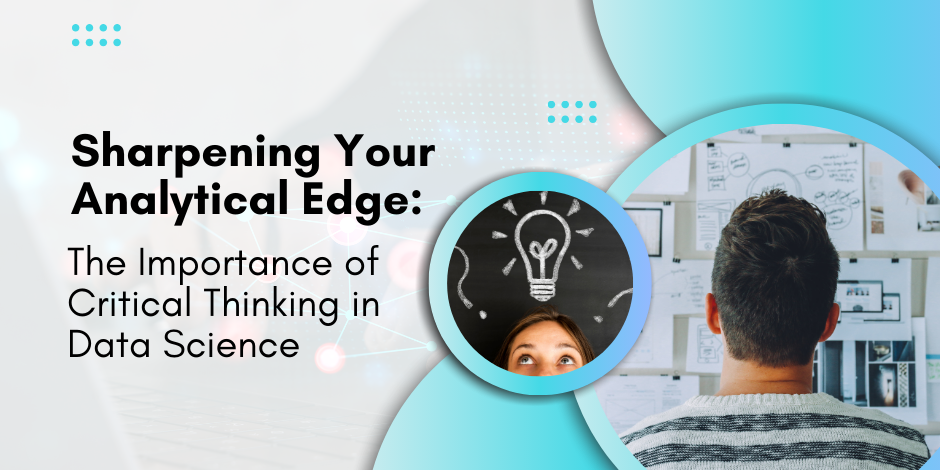Sharpening Your Analytical Edge: The Importance of Critical Thinking in Data Science

Stay Informed With Our Weekly Newsletter
Receive crucial updates on the ever-evolving landscape of technology and innovation.
As the digital age continues to evolve, the role of data science becomes increasingly significant.
Critical thinking in data science – which is the ability to analyse and interpret complex data sets, a highly sought-after skill in many industries – is more important than ever.
When critical thinking and technical expertise come together, the true power of data science is unlocked.
This article explores the importance of sharpening your analytical edge and the role of critical thinking in data science.
The intersection of data science and critical thinking

Data science is a field that combines domain expertise, knowledge of mathematics and statistics, and programming skills to extract meaningful insights from data.
It involves a multitude of processes, including data collection, data cleaning, data analysis, and data interpretation.
However, these technical aspects are only one side of the coin.
The other side is critical thinking, the ability to critically evaluate an issue to form an objective judgement.
We find the analytical edge at the intersection of data science and critical thinking.
Critical thinking in data science is the ability to understand and manipulate data, question assumptions, evaluate evidence, and make informed decisions based on the data at hand.
In other words, the analytical edge allows data scientists to turn raw data into actionable insights.
Critical thinking in data science: why it matters

Critical thinking in data science is essential.
After all, isn’t it enough to be proficient in programming languages like Python or R and to have a solid understanding of statistics?
While these skills are undoubtedly important, they must be sufficient.
Without critical thinking in data science, a data scientist might quickly draw incorrect conclusions from the data or fail to notice essential patterns or trends.
Furthermore, critical thinking in data science is essential for dealing with data’s inherent uncertainty and ambiguity.
Data is rarely clean or complete and often contains errors or inconsistencies.
Critical thinking in data science means recognising and considering these issues when analysing the data.
Critical thinking in data science leads to more reliable and accurate results and, ultimately, to better decision-making.
How to sharpen your analytical edge

So, how can one sharpen their analytical edge and become a better critical thinker in data science?
The first step is to develop a questioning mindset.
Critical thinking in data science involves being curious, open-minded, and sceptical.
Instead of taking things at face value, one should always ask questions and seek evidence.
For example, if a data set shows a particular trend, one should ask why it exists and what factors might influence it.
The second step is to improve one’s logical reasoning skills.
This can be done through practice and training.
Many resources available online, such as logic puzzles and games, can help one become a better logical thinker.
Additionally, it can be beneficial to study formal logic and argumentation, as these fields provide the theoretical foundation for critical thinking.
The third step is to learn how to deal with uncertainty and ambiguity.
This involves being comfortable with not knowing the answer and being able to make decisions based on incomplete or uncertain information.
One way to improve this skill is to regularly expose oneself to complex problems that need a clear or straightforward solution.
Conclusion
In conclusion, critical thinking in data science is a vital component.
It allows data scientists to turn raw data into meaningful insights and make better decisions based on these insights.
Data scientists can become more effective and valuable by sharpening their analytical edge.
So, whether you’re a seasoned data scientist or just starting in the field, remember to always question and analyse because critical thinking in data science matters.
Are you ready to boost your data science career? The Institute of Data’s Data Science & AI program offers an in-depth, balanced curriculum and flexible learning options taught by industry professionals.
Join us to get job-ready for this fascinating, dynamic field of tech.
Ready to learn more about our programs? Contact our local team for a free career consultation.




